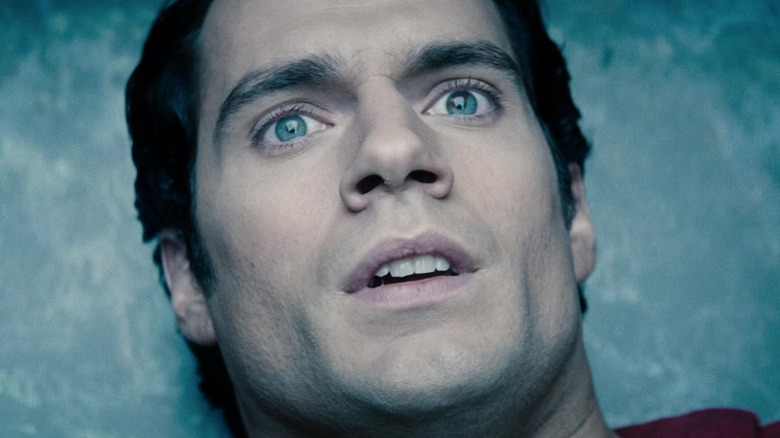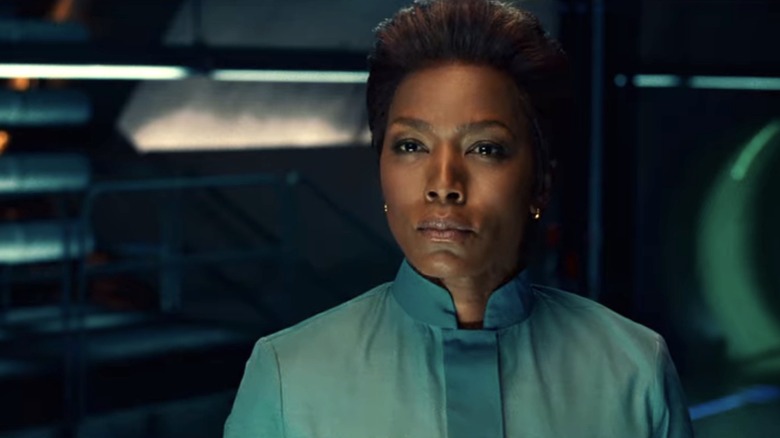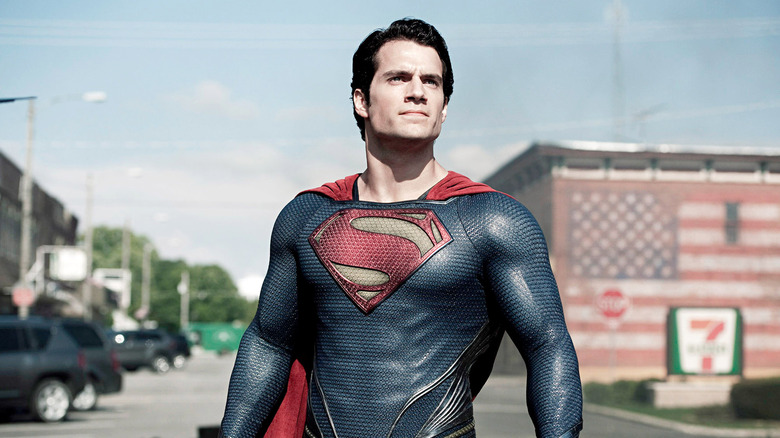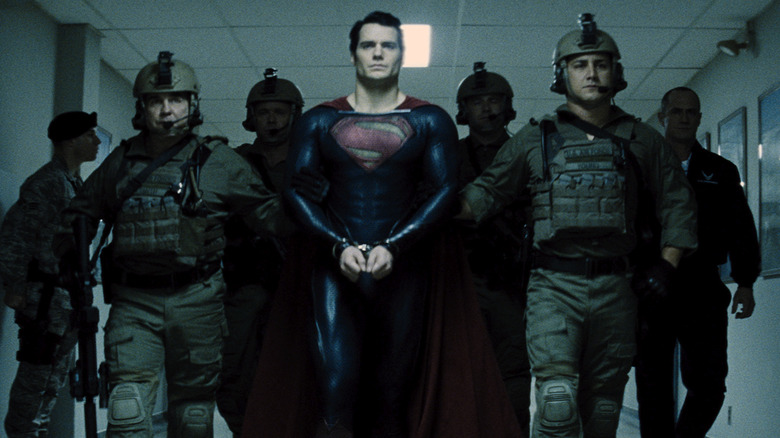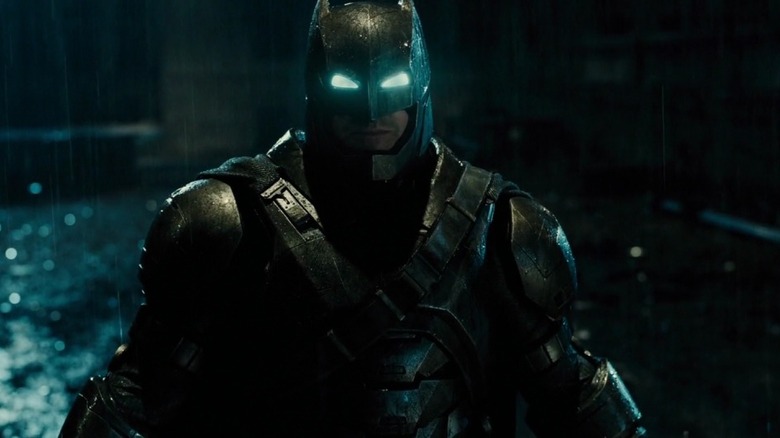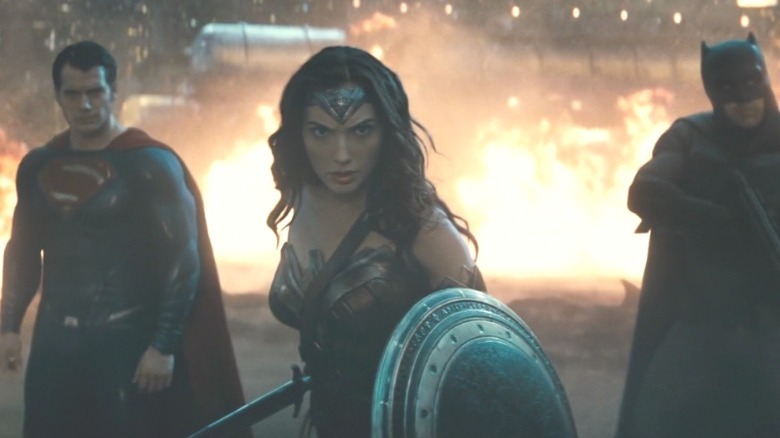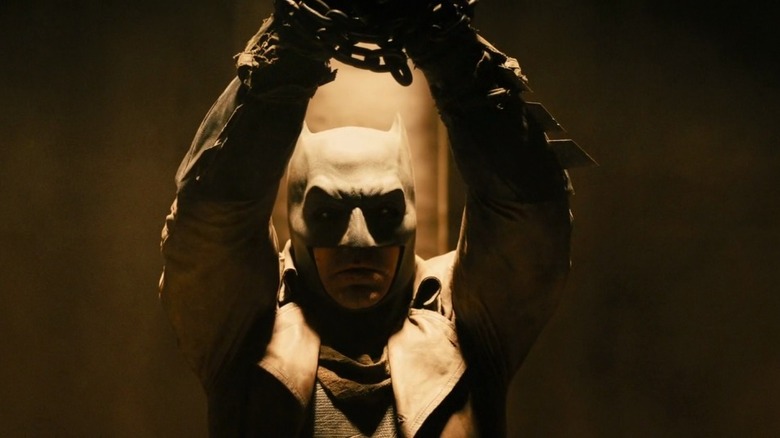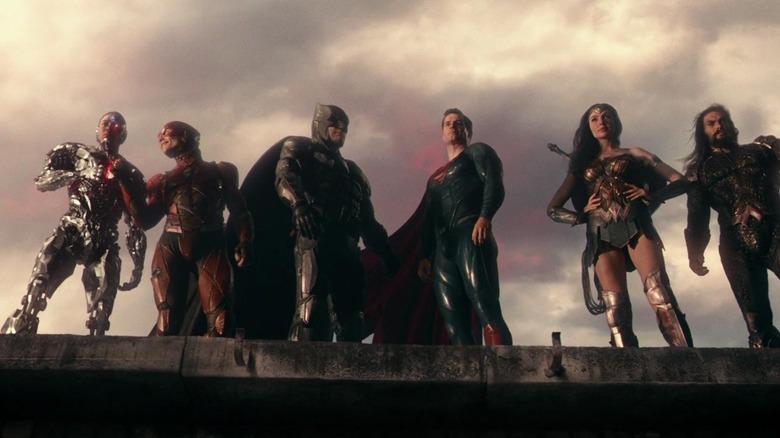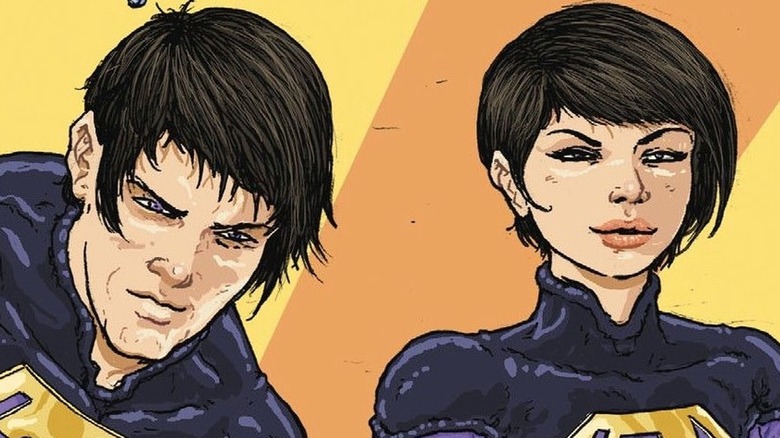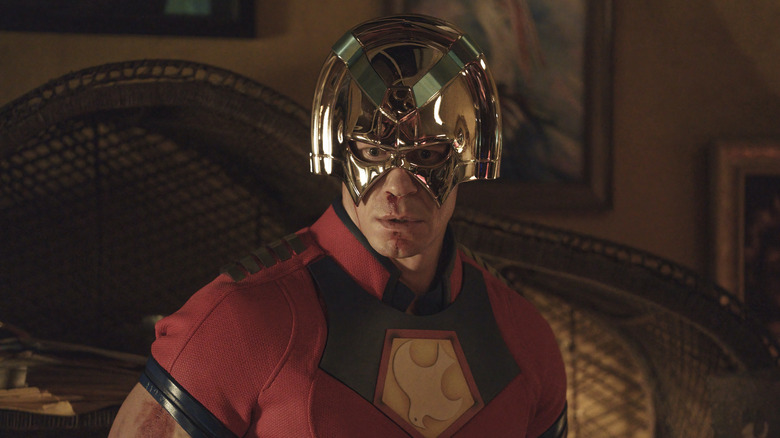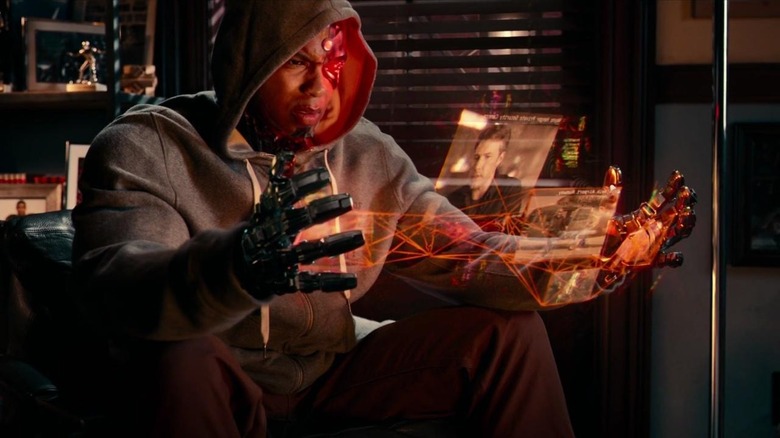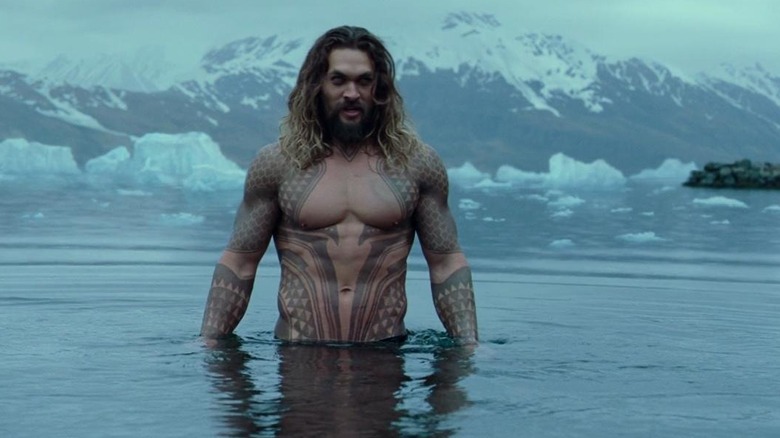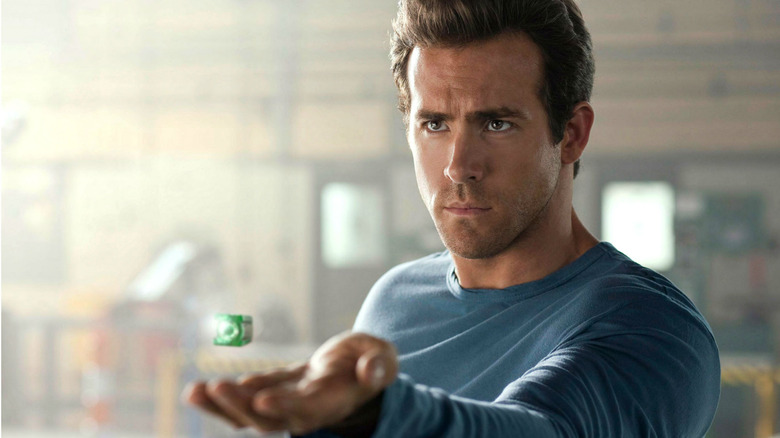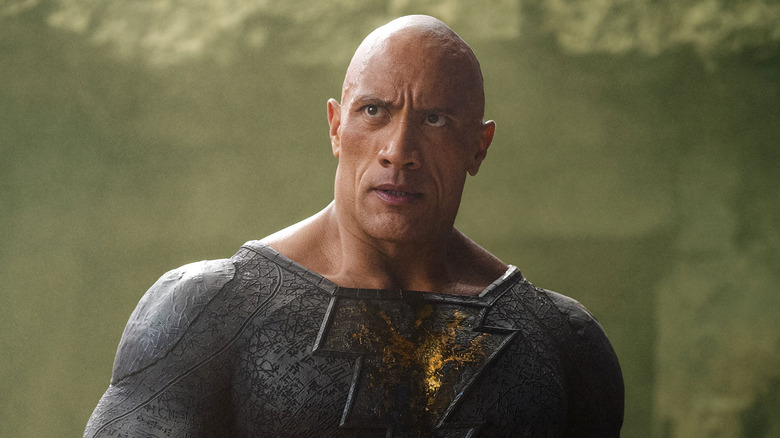The Rich History Behind The DC Extended Universe
In 2013, "Man of Steel" didn't just relaunch Superman as a big-screen icon. It also served as the first installment in the DC Extended Universe, a planned saga of interconnected movies and TV shows all based on characters from the massive lore of DC Comics. The productions in this franchise have run the gamut in scope and tone, ranging from darker blockbusters like "Batman v Superman: Dawn of Justice" to more modestly-budgeted, family-friendly fare like "Shazam!" There's a little bit of everything across the assorted DCEU titles, which even began to include television shows, starting with 2022's "Peacemaker" on HBO Max. Though the DCEU has cemented itself as a major part of the modern pop culture landscape, the success of this enterprise was never guaranteed and in fact its future remains in flux.
The rich history of the DCEU goes back to the early 2000s, when various attempts to launch movies that would feature crossovers between DC Comics legends failed to come to fruition. That's just the beginning of the expansive saga of how the DCEU came to be, with other important developments including where the name of this franchise came from, as well as concepts for DCEU movies that would never see the light of day. Just as the various DC Extended Universe properties offer something for everyone, its actual history is similarly vast.
Early attempts to make interconnected DC movies failed
The concept of bringing DC characters together into one movie heavily predates the existence of the DC Extended Universe. While cutesy lines in early projects like "Batman Forever" teased the idea of places like Metropolis coexisting with Gotham City, serious efforts to get such a project off the ground wouldn't happen until the 21st century. A proposed "Batman vs. Superman" movie would have brought new versions of Batman and Superman into a battle for the ages, but it never went into production. After this, Warner Bros. shifted its focus over to movies like "Batman Begins" and "Superman Returns."
However, the prospect of seeing DC Comics legends rub shoulders on the big screen seemed possible once again in 2007 with the development of George Miller's "Justice League: Mortal." Though the film was cast and production was slated to begin in Australia, a slew of difficulties, along with a writers' strike, kept it from coming to life. Another stab at interconnected DC movies was attempted with 2011's "Green Lantern," which featured Angela Bassett as Amanda Waller. Bassett expressed ambitions about being the equivalent to Samuel L. Jackson's Nick Fury in a series of interconnected DC movies, but the box office failure of "Green Lantern" ensured that it didn't happen. Though there was always interest from both audiences and artists in bringing these characters together in a movie, it wasn't until "Man of Steel" in 2013 that this would start to become a reality.
Man of Steel was intended to launch a cinematic universe
As the marketing campaign for "Man of Steel" got underway, the focus was just on making sure audiences were enamored with the idea of seeing a "Superman" movie on the big screen again. Posters and trailers for the movie did not emphasize or tease the presence of other DC Comics superheroes, with all the attention on Henry Cavill's debut as Superman. However, even if "Man of Steel" was being promoted as a standalone exercise first and foremost, there were already notions for how it could spin out into a much larger universe.
Screenwriter David S. Goyer explained to Bleeding Cool that he and director Zack Snyder had already had discussions about how "Man of Steel" could inspire other DC Comics movies. Specifically, the development of Superman making his presence known to the world and the climactic Battle of Metropolis in "Man of Steel" were seen as two elements that would reverberate throughout other DC superhero titles. Though he wasn't jumping the gun and announcing official plans before "Man of Steel" even hit theaters, Goyer did make it clear that this motion picture was not meant to be a one-off.
The first confirmation that DC characters would cross over
If you look closely in "Man of Steel," there are discernible hints that this incarnation of Superman inhabits the same universe as other DC Comics mainstays. Most notably, a logo for Wayne Enterprises appears during Superman's climactic battle in Metropolis. However, the interconnected nature of the DC Extended Universe was made unmistakably apparent during the Warner Bros. panel at San Diego International Comic-Con in 2013.
Director Zack Snyder was brought out during this panel, a little over a month after "Man of Steel" hit theaters, to discuss the future of Henry Cavill's Superman. This is when he called out "Man of Steel" actor Harry Lennix to recite a passage from the graphic novel "The Dark Knight Returns," to tease what the "Man of Steel" follow-up would entail. This passage concerns a clash between Superman and Batman, a duel that was confirmed to be heading to the big screen with the unveiling of a logo featuring the famous Superman "S" inside the Batman logo. There was still a lot about this impending showdown that wasn't clear at this event, including who would be playing the next incarnation of Batman. But with this announcement, all the continuity possibilities for the DC Extended Universe were made apparent.
The initial slate of DC Extended Universe titles
In October 2014, Warner Bros. announced on an earnings call its expansive plans for the DCEU. The then-upcoming "Batman v Superman: Dawn of Justice" was now planned as just the first step in a broader pantheon of titles based on DC Comics characters. The studio affirmed its commitment by revealing a massive swath of DCEU titles through 2020. This included an official confirmation that the first-ever live-action "Wonder Woman" and "Justice League" movies would be arriving in 2017 after years of anticipation. On top of all that, Warner Bros. also confirmed that new solo titles for Batman and Superman were on the way, but did not have release dates yet.
Also among the projects revealed were "Suicide Squad" and "Shazam!," both of which would not only get released but make the dates announced on the call. Other projects on this initial lineup either came out later than planned or were never produced. "The Flash," for example, would not come out in March 2018 as originally planned. Meanwhile, 2020 projects "Cyborg" and "Green Lantern Corps." would never see the light of day, along with a planned "Justice League" sequel in 2019. Announcing so many projects at once created lots of hype, but it also created expectations for the future that the DC Extended Universe would not be able to fulfill.
The term DC Extended Universe didn't originate with Warner Bros.
Among the many factors reflecting how the DCEU has always been in a state of evolution is how long it took for the name DC Extended Universe to even stick to this franchise. The term originated in a 2015 dive by EW writer Keith Staskiewicz into the then-upcoming "Batman v Superman: Dawn of Justice." As noted by EW critic Darren Franich in 2018, Staskiewicz's use of the term was made in jest, as made apparent by the comical use of the trademark symbol ("TM") after the phrase DC Extended Universe. However, without a concrete name for this franchise at the time, the term became surprisingly ubiquitous in pop culture reporting.
A Vulture piece in 2017, however, confirmed that Warner Bros. and DC brass did not use the phase DC Extended Universe when talking about movies like "Suicide Squad" or "Justice League." Even with this reveal, there was still no word on what the name was for this collection of films. Mystery surrounded this question for years until the earliest months of 2020. At a C2E2 panel in March 2020, DC executive Jim Lee officially referred to these movies as belonging to the DC Extended Universe. HBO Max using the DC Extended Universe term when it launched in May 2020 (via Comicbook.com), further confirming that a joke in an Entertainment Weekly column had become so much more than that.
The creation of DC Films
For almost the entire history of DC Comics film adaptations, there has been no standalone unit dedicated to producing these films. Warner Bros. has tackled films ranging from "The Dark Knight" to "Jonah Hex" as just standard titles on its annual slate, no different than "The Hangover" or "Argo." Despite being based on some of the most well-known fictional characters in history, these projects were often treated and released as just the latest Warner Bros. titles. Shortly into the existence of the DC Extended Universe, however, this changed with the creation of the DC Films banner.
This division within Warner Bros. was initially run by Geoff Johns and Jon Berg (via Deadline) and was announced following the divisive fan response to "Batman v Superman: Dawn of Justice" just two months earlier. With the initial DC Extended Universe titles failing to score with audiences, DC Films was launched to ensure there could be executives tasked exclusively with keeping an even closer eye on future entries in this franchise. The label wasn't being seen as quite as autonomous as rival company Marvel Studios, but it was still seen as a major development that would change the future of the DCEU.
The DCEU pumped the brakes on rigid continuity
Originally, the people behind the DC Extended Universe relished the way individual films in this franchise would cross over. This passion was apparent in the earliest DCEU entries. "Batman v Superman: Dawn of Justice" dedicated an entire scene to security footage that set up individual members of the Justice League. "Suicide Squad," meanwhile, contained two appearances from Ben Affleck's Batman. These movies were looking to constantly remind people that they were working in tandem with other DCEU stories.
But then "Dawn of Justice" and "Suicide Squad" turned into divisive motion pictures. This response, to movies that amplified the interconnected nature of the DCEU no less, caused a shift in how movies in this franchise were approached. By the end of 2017, key producers involved in the DCEU were noting (via Vulture) that rigid continuity was no longer a priority for the franchise. Largely standalone projects like "Wonder Woman" and "Aquaman" seemed to demonstrate validity to this approach, while the box office success of something like "Joker," made outside of the DCEU entirely, seemed to show the value in just letting DC adaptations be their own independent productions. However, this emphasis on standalone narratives wouldn't last forever. By 2021, the DCEU was once again expected to maintain serious continuity ties between projects (via THR).
The abandoning of DCEU streaming movies
As part of the initial strategy for the HBO Max streaming service, it was intended that the DCEU expand its output to also include movies made for HBO Max. "Batgirl" was set to kick off this initiative with a splash, thanks to its focus on a high-profile staple of DC Comics and the involvement of Michael Keaton as his version of Batman. "Batgirl" wasn't expected to be the last DCEU movie made for streaming, since several other projects for HBO Max were in various stages of development. This included a "Wonder Twins" movie, which would have starred KJ Apa and Isabel May in the lead roles (via Deadline) and was scheduled to start filming in summer 2022 for a 2023 premiere.
However, all these plans were scuttled once the newly merged Warner Bros. Discovery took over the DCEU. This conglomerate was keen on releasing feature films into theaters instead of streaming original movies on HBO Max. As a result, planned DCEU movies for HBO Max began to get scrapped, with "Batgirl" abandoned despite being deep into post-production and the planned "Wonder Twins" title was canned. What could have been a new avenue for storytelling in the DCEU instead turned into a casualty of the Warner-Discovery merger.
The expansion into television
With the Marvel Cinematic Universe and the "Star Wars" saga moving into the world of small-screen programming thanks to Disney+, it was only a matter of time before the DC Extended Universe would also explore the possibilities of televised storytelling. For nearly the first decade of this franchise's existence, there wasn't a trace of original programs set in this universe on television. There's never been an official reason for this, though it may have something to do with Warner Bros. Television creating its own separate small-screen universe through the various Arrowverse programs. TV spin-offs of "Man of Steel" or "Wonder Woman" could have intruded on that.
Whatever the reason, the DC Extended Universe finally got in on the television game (via Inverse) in January 2022 with "Peacemaker." This project brought back John Cena as Peacemaker from the 2021 DCEU film "The Suicide Squad," for more often hilarious adventures that involved delving into the violent character's disturbing past. "Peacemaker" was the first TV show for the DCEU, but it won't be the last. An Amanda Waller show is on the docket, while an HBO Max program produced by Michael B. Jordan, focusing on Val-Zod, is also in the works. It took the franchise a while to get to this domain, and we'll see if it continues to produce content for the world of television.
The abandoned DCEU movies
While the DCEU has yielded several movies since 2013, it's also left behind a number of unmade projects. Among these discarded motion pictures was a solo outing for Cyborg, once set for an April 2020 debut. "Suicide Squad" director David Ayer also once worked on a "Gotham City Sirens" movie, which would have starred Harley Quinn alongside other female villains from DC Comics lore, while a spin-off movie for Will Smith's Deadshot also never got off the ground (via Rolling Stone). Ava DuVernay's "New Gods" film was canned in April 2021 after three years of work on its screenplay while initial plans for a second "Justice League" movie that would have premiered in June 2019 also ended up going unrealized.
Arguably the most infamous of these abandoned movies was one that actually finished shooting. "Batgirl" was set to star Leslie Grace as the titular crime-fighter and was planned as an HBO Max original movie. However, in August 2022, Warner Bros. Discovery brass opted to shelve the feature permanently (via Vanity Fair), due primarily to financial considerations. The "Batgirl" situation was unique, but it's now just one of many DCEU projects that have been abandoned.
Which version of Justice League is canon in the DCEU?
Unlike most other titles in the DC Extended Universe, two vastly different versions exist of "Justice League." The first is its theatrical cut, largely cobbled together from footage originally shot by Zack Snyder and reshoots overseen by Joss Whedon. The other is "Zack Snyder's Justice League," which debuted on HBO Max in March 2021. While some differing cuts of movies only feature minimal differences, these two visions of "Justice League" may as well hail from different planets in how distinct they are from one another.
Considering how different they are, it's inevitable that fans of the DCEU would start to wonder which incarnation of "Justice League" is now considered canon. There have been varying answers to that question over the years. "Wonder Woman" director Patty Jenkins has said (via Cinemablend) that she considers Snyder's version of "Justice League" canon and noted that other DCEU filmmakers share her opinion. However, Snyder said in 2021 that he believes Warner Bros. doesn't consider "Zack Snyder's Justice League" canon in the DCEU. This uncertainty has only been compounded by how recent installments in the DCEU, such as "Aquaman," have only made brief, if any, references to the events of "Justice League," none of which have been specific enough to shed light on which version is in fact canon.
Where is Green Lantern in the DCEU?
Green Lantern has existed in DC Comics lore in one fashion or another since the 1940s, while the character was also a founding member of the Justice League. In the comics, Green Lantern is a seminal figure of DC mythology. In the DC Extended Universe, however, it's a different story. Thanks to the 2011 movie "Green Lantern" becoming a box office dud and instant punchline, Green Lantern and all the mythology connected to this superhero has been largely MIA from this expansive franchise.
The closest fans have gotten to seeing this character in action on the big screen again is through an appearance by a member of the Green Lantern Corps in both versions of "Justice League." Specifically, the character Yalan Gur shows up in a flashback as one of legions of superbeings protecting Earth from the forces of Darkseid. While this cameo confirmed the existence of the Green Lantern Corps in the DCEU, no other members of the organization, particularly its most famous fighters like Hal Jordan or John Stewart, have made appearances.
Other plans to incorporate the Green Lantern characters into DCEU properties have never come to fruition. Zack Snyder's attempt to get John Stewart into the ending of "Zack Snyder's Justice League" failed to come to fruition (via Vanity Fair), while the movie "Green Lantern Corps," initially announced for June 2020, never saw the light of day.
The future of the DCEU remains unclear
With all things DC-related now under new ownership thanks to the creation of Warner Bros. Discovery (via CNBC), the DCEU is now heading in a new direction. This might seem like a strange decision, given that this saga has already grossed $5.8 billion for Warner Bros. and has a moderate hit on its hands with "Black Adam." But CEO David Zaslav has been adamant about shaping a fresh future for the DCEU, including setting up a massive 10-year agenda for the brand.
Going in such a drastically different direction for the DCEU has proven to be a messy process. In August 2022, The Hollywood Reporter noted that many employees working in or around DC Films were baffled by Zaslav's choices and were left uncertain about the status of previously-championed projects in the pipeline, including "Batgirl" and others.
On a brighter note, Zaslav's search for someone to run the DC business — the equivalent of Marvel Studios chief creative officer Kevin Feige — seemed to come to an end in late October 2022 with the announcement that "Peacemaker" and "Guardians of the Galaxy" auteur James Gunn and longtime producer Peter Safran had been put in charge of the renamed DC Studios (via Deadline).
More exact details of the vision that Gunn, Safran, and Zaslav have for the future of DC Studios — including whether the DCEU as known since 2013 still exists — remain to be heard. For now, titles like "The Flash" and "Aquaman and the Lost Kingdom" will attempt to maintain audience confidence in all the possibilities that DC still can offer.
